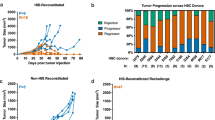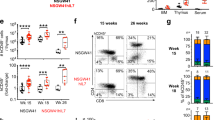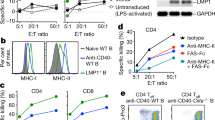Abstract
Moloney murine leukaemia virus (M-MuLV) and Moloney murine sarcoma virus (M-MuSV) are competent and replication defective forms, respectively, of a type C retrovirus which is oncogenic in some inbred mouse strains1. M-MuLV induces lymphomas, mostly of T lymphocyte origin, following injection into newborn animals. M-MuSV together with M-MuLV, its natural helper, and in the absence of an appropriate immune response can elicit the formation of an unusual sarcoma which may grow and kill. This sarcoma is unusual in that, at least initially, it is a polyclonal entity within which continual recruitment of previously uninvolved mesenchymal cells occurs2. Resistance to the induction of tumours by M-MuSV is thought to depend on activation of appropriate T lymphocytes. The main evidence for this is the finding that animals numerically deficient in T lymphocytes are highly susceptible to sarcoma induction3–5 and that normal mice and previously challenged animals can generate T lymphocytes specifically cytotoxic in vitro for tumour cells carrying viral antigens6. Animals injected with M-MuLV at birth are susceptible to M-MuSV challenge and incapable of generating cytotoxic T lymphocytes active against virus-infected cells in vitro7,8. On the other hand, the M-MuLV neonatally injected animals immunized as adults against allogeneic leukaemic cells are fully competent in generating alloreactive cytotoxic T lymphocytes8. T-cell deficient mice can in addition be reconstituted in their capacity to resist challenge by M-MuSV by implantation of syngeneic thymus grafts or injection of normal T lymphocytes4,5. The exact role of T lymphocytes in the control of the acute phase of the infection with M-MuSV is not certain but it probably involves a cytotoxic capacity of T cells comparable with that seen in vitro. The role of antibody in bringing about resistance is not clear, as passive immunization per se is relatively ineffective in preventing tumour growth in T-cell deficient mice5, as was transfer of specifically primed B cells (our unpublished data). We present here evidence that neither thymuses nor peripheral lymphocytes removed from mice injected with M-MuLV at birth are capable of reconstituting T-cell deficient mice in such a manner as to promote resistance to challenge with M-MuSV.
This is a preview of subscription content, access via your institution
Access options
Subscribe to this journal
Receive 51 print issues and online access
$199.00 per year
only $3.90 per issue
Buy this article
- Purchase on Springer Link
- Instant access to full article PDF
Prices may be subject to local taxes which are calculated during checkout
Similar content being viewed by others
References
Levy, J. P. & Leclerc, J. C. Adv. Cancer Res. 24, 1–66 (1977).
Chieco-Bianchi, L. & Collavo, D. in Scientific Foundations of Oncology (eds Symington, T. & Carter, R. L.) 388–393 (Heinemann, London 1976).
Stutman, O. in The Nude Mouse in Experimental and Clinical Research (eds Fogg, J. & Giovanella, B.) 411–435 (Academic, New York, 1978).
Collavo, D., Colombatti, A., Biasi, G., Chieco-Bianchi, L. & Davies, A. J. S. Nature 249, 169–170 (1974).
Collavo, D., Colombatti, A., Biasi, G., Chieco-Bianchi, L. & Davies, A. J. S. J. natn. Cancer Inst. 56, 603–608 (1976).
Collavo, D., Parenti, A., Biasi, G., Chieco-Bianchi, L. & Colombatti, A. J. natn. Cancer Inst. 61, 885–890 (1978).
Chieco-Bianchi, L. et al. in Tumour-associated Antigens and their Specific Immune Response (eds Spreafico, F. & Arnon, R.) 71–84 (Academic, New York, 1979).
Chieco-Bianchi, L., Sendo, F., Aoki, T. & Barrera, O. L. J. natn. Cancer Inst. 52, 1345–1350 (1974).
Colombatti, A., De Rossi, A., Taylor, B. A., Chieco-Bianchi, L. & Meier, H. Int. J. Cancer 21, 179–185 (1978).
Colombatti, A., De Rossi, A., Hilkens, J., Collavo, D. & Chieco-Bianchi, L. J. natn. Cancer Inst. 62, 1451–1457 (1979).
Myburgh, J. A. & Mitchison, N. A. Transplantation 22, 236–244 (1976).
Author information
Authors and Affiliations
Rights and permissions
About this article
Cite this article
Chieco-Bianchi, L., Collavo, D., Zanovell, P. et al. Lack of M-MuSV tumour regression associated with T lymphocyte tolerance. Nature 285, 667–668 (1980). https://doi.org/10.1038/285667a0
Received:
Accepted:
Issue Date:
DOI: https://doi.org/10.1038/285667a0
Comments
By submitting a comment you agree to abide by our Terms and Community Guidelines. If you find something abusive or that does not comply with our terms or guidelines please flag it as inappropriate.



